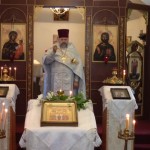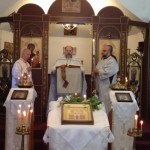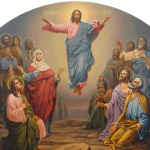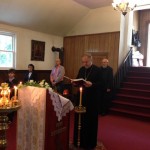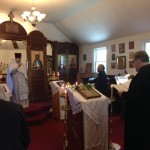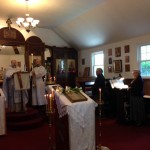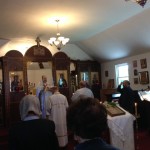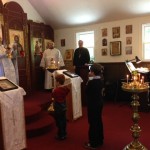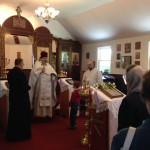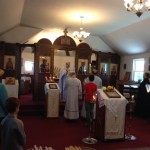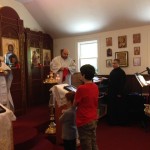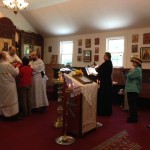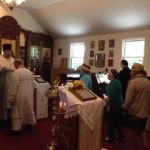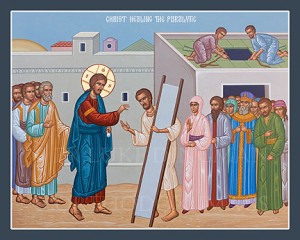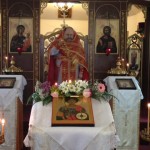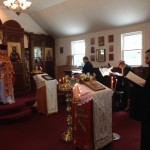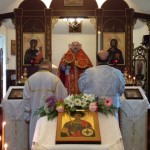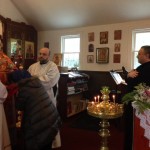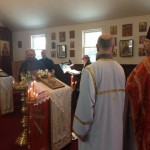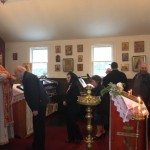On May 29, on the feast of the Ascension of the Lord into heaven, Archpriest Igor Tarasov, Rector of St. George Church, celebrated Divine Liturgy in our temple. After the Scripture lessons he preached a sermon:
“Today’s feast of the Ascension of our Lord Jesus Christ into heaven has a great significance. Our Lord accomplished His mission of salvation and now He has to return to His heavenly abode. He lived a righteous life of a just Man, He performed glorious miracles, He taught the people, He humbled Himself to die on the cross. Then He was risen from the dead and instructed His disciples, being with them for 40 days. Now it is time for the Lord to return where He came from. Ascending into heaven Jesus takes there both His divine nature, as well as His human nature. Thus, our nature in Jesus is now in heaven, at the right hand of God the Father. Jesus left the Apostles on earth, but He went to prepare a place in heaven for those who follow Him. These are the basic spiritual aspects of this important feast. But today’s Epistle lesson tells us a little different things regarding Ascension.”
“Today we read the very beginning of the book of the Acts of the Apostles. The writer, St. Luke describes the event of the Ascension. He says that the Lord commanded the Apostles “not to depart from Jerusalem, but to wait for the Promise of the Father” (Acts 1, 4). By that Promise of the Father, Jesus meant the Holy Spirit Who was going to be sent upon the Apostles. To confirm that the Lord said, “For John truly baptized with water, but you shall be baptized with the Holy Spirit not many days from now” (Acts 1, 5). The Holy Spirit was going to be poured out on the Apostles very soon. So, the first idea of today’s Epistle lesson is to wait for the descent of the Holy Spirit.”
“However, even after seeing the glory of the Lord in His Resurrection, even after being instructed by Jesus for forty days after that glorious event, the Apostles still lived by the ideas of this world. They asked the Lord whether He at this time will restore the kingdom of Israel (Acts 1, 6). This was because they have not yet received that promised gift of the Father, the Holy Spirit Who would enlighten them and guide the Apostles in all spiritual matters. Instead of asking about eternal wisdom, they are wondering about earthly, political and temporary things. Jesus patiently instructs them saying, “It is not for you to know times or seasons which the Father has put in His own authority. But you shall receive power when the Holy Spirit has come upon you” (Acts 1, 7-8).”
“Then in today’s Epistle lesson follows the description of the Ascension itself. “Now when He had spoken these things, while they watched, He was taken up, and a cloud received Him out of their sight” (Acts 1, 9). Jesus was taken up, He was received by a cloud. We may note that clouds have a special meaning in the Scripture. They indicate the presence of God. A number of times in the Bible the clouds are mentioned when God appears to someone. A cloud enveloped Mount Sinai when Moses went up there to receive Ten Commandments. When our Lord transfigured on Mount Tabor also a cloud was there from which the Apostles heard the voice of God. As we also see, not only a cloud but a high place, a mountain indicates a special place where men can receive God’s revelation. The Scripture mentions a number of mountains where God revealed Himself or His will to the people. At this point, the Ascension took place on Mount of Olives near Jerusalem. Ascension was a special, supernatural, divine event.”
“But today’s Epistle reading is not so much concerned with the very event of the Ascension, as it is with the future life and deeds of the holy Apostles. As we said the Lord Jesus before being taken up to heaven instructs them regarding the future descent of the Holy Spirit. He commands them to wait for that Promise of the Father. And when He was ascended the Angels also advised the Apostles not to stand idly gazing into heaven, but to go and prepare themselves for receiving the precious gift of God. The Epistle tells us, “And while they looked steadfastly toward heaven as He went up, behold two men stood by them in white apparel who also said, “Men of Galilee, why do you stand gazing up into heaven? The same Jesus, who was taken up from you into heaven, will so come in like manner…”” (Acts 1, 11). The Apostles had to go and begin their ministry, begin to continue the mission of Jesus and await His second coming. They could mot stand gazing into heaven, but to prepare living Christ-like lives, as His servants, filled with the Holy Spirit.”
“Therefore, dear brothers and sisters! Let us honor today’s feast. But let us not just stand staring up into heaven, but go and live Christian life, do the works of faith, love and charity. Let us acquire the Holy Spirit in the Sacraments of the Church. Let us live a Christ-like life awaiting the second coming of the same Jesus, who was taken up from us into heaven, and who will come in like manner as the Apostles saw Him go into heaven (Acts 1, 11).”
Upon the Liturgy dismissal the Rector and the altar servers came out of the sanctuary to the middle of the temple and performed the rite of glorification before the icon of the feast. They sang troparion, kontakion and magnification of the holy day.

